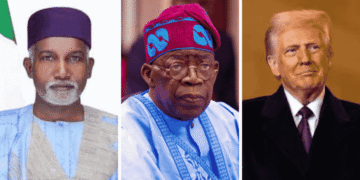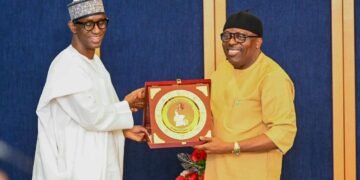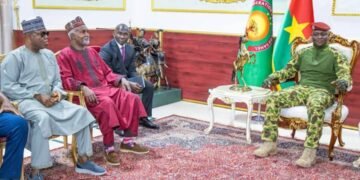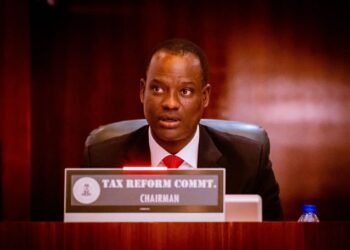President Muhammadu Buhari made a televised broadcast yesterday, Sunday , the 29th of March, 2020 on measures being taken by his Administration to contain the spread of the coronavirus disease in Nigeria. Since then some concerns have been raised about the legality and constitutionality of certain aspects of his pronouncements and actions, especially as they relate to restriction of movement and imposition of curfew in Lagos and Ogun States, and in the Federal Capital Territory, Abuja, for 14 days.Paragraphs 34-45, and 49-54, and 57 of the Presidential Broadcast contain clear and far reaching orders and directives that do not only suspend constitutionally guaranteed rights to liberty and freedom of movement, but also shut down businesses and economic activities for a fortnight, all in a bid to contain the spread of the deadly coronavirus.The concerns that have been raised are whether the President could give these orders and directives outside the invocation of, and compliance with the provisions of Section 305 of the Constitution of the Federal Republic of Nigeria, 1999, governing the declaration of a state of emergency. Under the provisions, the President, subject to the provisions of the Constitution, may by instrument published in the Official Gazette of the Government of the Federation issue a Proclamation of a state of emergency in the Federation or any part thereof. Section 318 of the Constitution ( the interpretation section ) defines the “ Federation” as “ the Federal Republic of Nigeria “.It has been contended that the President can only lawfully exercise emergency powers regarding the enumerated situations, under Section 305 (3) of the Constitution, if there is a proclamation to that effect and if there is a concurring passage of a resolution by the two Houses of the National Assembly approving the proclamation and details of the emergency. Under Section 305(4) of the Constitution, “ the Governor of a State may, with the sanction of a resolution supported by two-thirds majority of the House of Assembly, request the President to issue a Proclamation of a State of Emergency in the State when there is in existence within the State any of the situations specified in subsection 3 (c; d & e) of Section 305 , and such situation does not extend beyond the boundaries of the State.”Be it noted that coronavirus infections in Nigeria do not only extend beyond Lagos State or Ogun State; and the Federal Capital Territory, but also beyond Nigeria. It is a global pandemic. This implies that since coronavirus spread is national, if a proclamation of a state of emergency envisaged and stipulated by the Constitution is required to tame it , such proclamation, albeit could be in consultation with the affected states in the Federation, may not originate from or requested by the States, as a sine qua non ( condition precedent) before the President and the National Assembly can act and exercise the powers that are conferred on them by Section 305.It has also been argued that a brand new legislation on the subject is needed for the Federation and for the affected states. And in this connection, Lagos State has passed one. This may well be so. However, quite apart from the untidiness of each of the States in the Federation which may be affected passing their respective laws , thereby risking lack of uniformity, it is submitted that non amendment of an existing law, no matter how old the law may be, or the absence of a new law to replace and reenact that old law, is not a valid argument for no recourse to the old law , when occasion does clearly demands, and the situation so manifestly warrants.The Quarantine Act , Cap Q2, Laws of the Federation of Nigeria, 2004 is, no doubt an archaic colonial legislation. But it is an existing law deemed to have been made by the National Assembly ( See Section 315 of the Constitution).Under Section 3 of the Act, “ the President may, by notice, declare any place whether within or without Nigeria to be an infected local area, and thereupon such place shall be an infected local area within the meaning of the Act” .By Section 4,“ the President may make regulations for all or any of the following purposes—(a) prescribing the steps to be taken within Nigeria upon any place, whether within or without Nigeria, being declared to be an infected local area;(b) prescribing the introduction of any dangerous infectious disease into Nigeria or any part thereof from any place without Nigeria, whether such place is an infected local area or not;(c) preventing the spread of any dangerous infectious disease from any place within Nigeria, whether an infected local area or not, to any other place within Nigeria;(d) preventing the transmission of any dangerous infectious disease from Nigeria or from any place within Nigeria, whether an infected local area or not, to any place without Nigeria;(e) prescribing the powers and duties of such officers as may be charged with carrying out such regulations;(f) fixing the fees and charges to be paid”Although , the Quarantine Act is an old colonial legislation ( 1926, No. 18; 1929, No. 7; and 1954, No. 131), it is our considered view that the provisions of the Act are not only applicable to the measures the Federal Government of Nigeria ( or the President) have taken or about to take , as communicated in the said Presidential Broadcast, but are more applicable to the current public health situation than invoking the constitutional provisions of declaration of a state of emergency. While the subject of “ endangerment of public health “ is not excluded as one of the situations warranting the declaration of a state of emergency under Section 305 of the Constitution, it is submitted that the focus of declaration of a state of emergency under the Constitution is, strictly speaking, not for the preservation of public health. Preservation of public health is not mentioned under Section 305.The provisions governing the declaration of a state of emergency in the Constitution are enumerated powers. And although the provisions of the Constitution must be interpreted as a whole, liberally and without stultifying narrowness, care must always be taken to construe enumerated statutory or constitutional provisions containing penal clauses which abridge or suspend constitutionally guaranteed liberties or legal rights, strictly and narrowly, lest they unwittingly become a cover or license for executive arbitrariness or despotism.Declaration of a state of emergency under the Constitution is made when :The Federation is at war;The Federation is in imminent danger of invasion or involvement in a state of war;There is actual breakdown of public order and public safety in the Federation or any part thereof to such extent as to require extraordinary measures to restore peace and security ;There is a clear and present danger of an actual breakdown of public order and public safety in the Federation or any part thereof requiring extraordinary measures to avert such danger ;There is an occurrence of imminent danger, or the occurrence of any disaster or natural calamity affecting the community or a section of the community in the Federation;There is any other public danger which clearly constitutes a threat to the existence of the Federation; orThe President receives a request to do so in accordance with the provisions of subsection 4 of Section 305 of the Constitution “It is plain from the above enumerated situations that the focus of the declaration of a state of emergency provisions in the Constitution is war, imminent war or invasion of Nigeria or involvement of Nigeria in a war ; preservation of public order and safety and restoration of peace and security; actual breakdown of public order and public safety and averting such danger ; occurrence of any disaster or natural calamity , affecting the community or a section of the community in the Federation; or any other public danger which clearly constitutes a threat to the existence of Nigeria.It is submitted that the Quarantine Act is a special legislation, containing special provisions which empower the President to make regulations to contain and manage infectious diseases. It is a specific public health and safety legislation. Section 305 governing declaration of a state of emergency, on the other hand, is a general provision dealing with a state of emergency of many kinds.It is admitted that the Quarantine Act is in need of urgent amendments to capture in specific terms infectious diseases that have developed since 1929 ( Ebola, Lassa Fever, Coronavirus, et cetera ). It is also desirable to make the powers exercisable therein to be shared amongst the three tiers of government in Nigeria or by the units of the Federation, in accordance with federalist principles. This is because the Quarantine Act was made by a colonial Nigeria that was then practicing a unitary system of government. Nigeria was yet to adopt Federalism when the law was made ( it did so gradually vide McPherson Constitution of 1951; Lytletton Constitution of 1954 and Independence Constitution of 1960). With the adoption of Federalism ( regardless of its counterfeiting by military tinkering in latter years and the retention of that perversion in the prevailing constitutional arrangement), the powers conferred by the Quarantine Act ought to be shared executive powers. Thus , there could be ( and should be ) a Quarantine and Public Health Act coexisting with a Quarantine and Public Health Law, made by the States in the Federation.However, in spite of the inadequacies of the Act for the current time, the powers conferred by the Act rightly can be exercised by the President of Nigeria. The Public Officers Protection Act ( Law), for example, is a law of general application in Nigeria. Our courts rigidly enforce the law , a statute of limitation which abrogates a right of action in a court of law against a public officer or public office for any civil wrong done in the course of discharge of his or its public duties, if and when a civil action is not brought or filed by a wronged person, within three months of the occurrence of that civil wrong.Not many lawyers know that the Public Officers Protection Act ( Law ) was an old colonial law made in 1916, vide “ an order in Council” , not even through a robust legislative process.It is, therefore, in our considered view a lame assertion that because the Quarantine Act is dated , it can no longer be resorted to in dealing with current challenges of infectious diseases.No doubt , the Presidential Broadcast made yesterday is not a regulation that is contemplated by the Quarantine Act. A mere broadcast of a head of state without more, not being a coup de tat broadcast , the pronouncements of which are to be enforced by martial law, cannot and does not qualify as a regulation envisaged and required by the Quarantine Act. In the circumstances, it is our assumption that before the broadcast , or after (and in any case before the commencement of the implementation of the orders and directives contained in the Broadcast), a piece of regulation embodying the orders and directives would have been or would be made and published in the Federal Gazette ( Public Notice). Certainly, the State Governments, the Military, Security and Law Enforcement Agencies, Ports Authorities, NCDC and Health and Safety authorities cannot be referring to the texts of the broadcast as their enabling authorization or authority to act.There must be a published government instrument or executive order or regulation which will be published by gazette and made available to Nigerians . Government business is a serious business. We hope that the AGF and the SGF are reading.Once these rough edges are straightened, no lawyer can rightly argue that the steps taken by the President, as stated in his broadcast, are illegal and unconstitutional.
Jiti Ogunyele
Lagos
Source Premium Times































